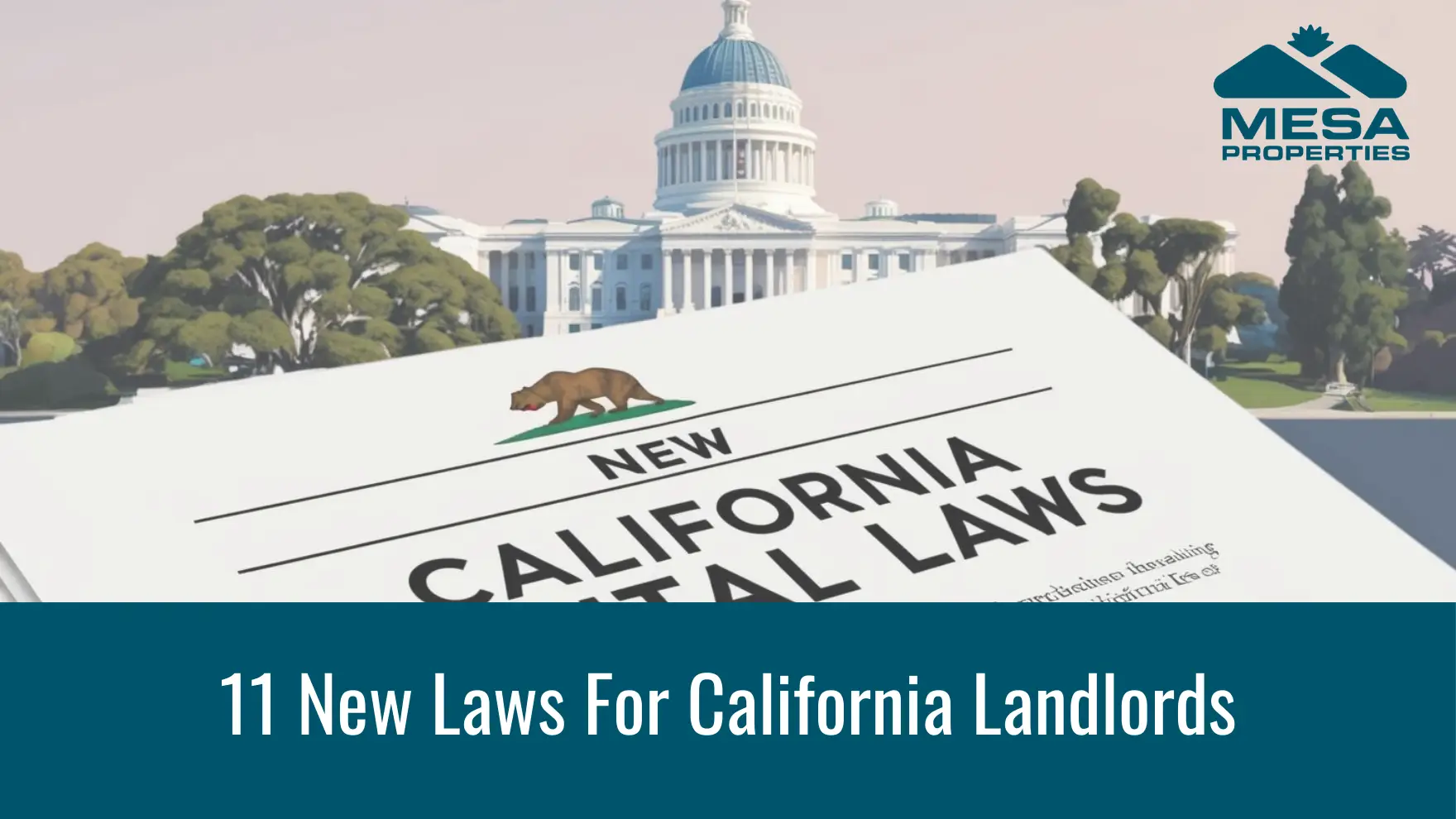2025 is here and with it come a slew of new laws that affect California landlords.
We’ve selected 11 of the most impactful laws to discuss for the typical client that we serve. Laws affecting affordable housing, large multi-family properties, or commercial properties are not discussed here.
1. AB 2747 - Mandatory Offer of Credit Reporting
This law requires landlords of buildings with 15 units or more or landlords that own more than 1 residential rental property or landlords that are a REIT or corporation to offer positive rental payment reporting to at least 1 credit bureau. Landlords can only charge the lesser of $10 or the actual cost to provide the service, unless of course the landlord does not incur a fee to provide the service.
Note that this is only positive rental history reporting. Landlords need to offer positive rental history reporting with all leases beginning on 4/1/25 and must provide notice to tenants of leases existing as of 1/1/25 of the same offer.
If a tenant defaults on the payment, landlords are not allowed to use rent income to cover it and cannot use any unpaid fee amount for this service as a reason for termination of tenancy or any other punitive action. The landlord is able to stop the reporting if the fee remains unpaid for 30 or more days.
2. AB 2493 - Application Fees
AB 2493 codifies the way we at Mesa already approach application processing, which is essentially a first come, first qualified, first granted approach. We believe it to be the most fair and unbiased way to process applications and now it appears, the California State Legislature agrees. Many landlords want to treat the application process like a job interview where the “best” applicant gets the property. We disagree with this approach because of its potential to violate Fair Housing laws, and while California has not outright banned this approach, they have made it much more difficult to choose this option.
This law only allows landlords to charge an application fee if they do one of two things:
- The Job Interview Method - Refund all applicants not selected, regardless of reason, if their application is treated like the “job interview” approach above. This means if the landlord is not using a first come, first qualified, first granted approach, they must refund the application fee for all applicants, even if the applicant would have been denied for not meeting the landlord’s criteria. This refund must occur within the lesser of 7 days of a tenant being selected or 30 days of the application being received.
- The Mesa Method - Process applications on the first come, first qualified, first granted approach. The landlord must present their requirements along with the application form. Once a tenant is selected, using this approach any remaining applicants that were in process must either be refunded within 7 days or have their application transferred to another property that the landlord has available for rent. Using this approach, landlords are able to retain the application fees for applications that were considered but denied for not meeting the landlord’s posted criteria.
3. SB 611 - Fees and Security
This law prevents landlords from charging a fee for the service of any notice on the tenant. Since California still requires the physical posting of certain notices such as the 3 day notice to pay rent or quit and the 60 day notice of termination of tenancy, landlords often incur significant costs in the service of these mandatory notices. In the past, it has been common practice for landlords to charge a notice service fee to compensate for those costs.
SB 611 bans that practice and also bans landlords from charging any fees for processing a physical check from tenants.
4. SB 1051 - Changing Locks Due to Domestic Violence
This law requires landlords to pay for the changing of locks when a tenant requests it due to being a victim of domestic violence. They must provide proof of the claim.
The landlord only has 24 hours to comply with the request. If they fail to change the locks within 24 hours of the tenant’s request, then the tenant can change them themselves and notify the landlord within 24 hours that the locks were changed as well as provide the landlord with the new key. The landlord will then have 21 days to reimburse the tenant for their cost of changing the locks.
This law also makes it illegal for landlords to deny or conditionally approve applicants for exercising their rights under this law, including changing locks and terminating a tenancy due to being the victim of domestic violence.
5. AB 2801 - Security Deposits
This law, similar to AB 2493, essentially codifies the “Mesa Way” meaning the way we already conduct our business.
Beginning on 4/1/25, landlords will need to take photos of the property immediately after receiving possession back from a tenant and before any repairs or cleaning take place and also immediately after repairs are made or cleaning is done. Additionally, landlords will need to send photos along with the standard itemized list of what the deposit was used for and a written explanation of the cost of the repairs or cleaning.
Finally, landlords are not able to charge for professional carpet cleaning or professional cleaning unless those services are necessary to return the unit to the same condition it was in prior to being rented out excluding ordinary wear and tear.
6. AB 2898 - Unbundled Parking
This law requires that landlords unbundle parking from the lease. If landlords want to charge for parking or have an agreement related to parking, they must do so in an agreement that is separate from the lease agreement.
The reason behind this change is so that a landlord cannot use the non-payment or other violation of the parking agreement as a reason to evict a tenant.
7. AB 2347 - Time Extension for Evictions
This law gives the defendant in an unlawful detainer case (eviction) 10 business days to respond by filing an answer to the eviction instead of the current 5 days.
This will extend the amount of time for landlords to regain possession of their property in an eviction by at least a week. Good news in this law is that it also reduces the time for responsive pleadings (demurrer, motion to strike) to between 5 and 7 days instead of the current 30 days.
8. AB 2579 - Balcony Inspections
You may recall our 2019 blog post on new laws which highlighted the balcony inspection law and its mandatory requirement for owners to have balconies inspected by 1/1/2025. Nothing has really changed here except that the 2025 deadline has been pushed out to 1/1/2026 and Civil Engineers are now able to conduct those inspections.
9. AB 653 - Housing Authority Reporting Requirements
This is a welcome law which will require Housing Authorities to provide annual reports with data on their monthly success rate, payment standards, inspection wait times, and total search time for voucher holders to obtain housing.
We work with housing authorities all the time and know first hand how delayed they can be and how bad the communication can be. The hope with this new law is that there will be more transparency and accountability for housing authorities to be efficient and productive with their use of funds and assistance to voucher holders and landlords alike. We would sure love to see increased efficiency here!
10. AB 2684 - Extreme Heat
If you don’t have central AC in your rental property, start budgeting to install it soon.
In January 2028, extreme heat will be added to local cities’ and counties’ safety of housing element or local hazard plans.
We are already seeing proposals to add a minimum indoor temperature requirement in order for a rental property to be considered habitable. The addition of extreme heat hazard plans will almost certainly bring this to fruition. It is highly likely that in the next few years, landlords will be required to provide central AC in rental homes and that central AC will be required to maintain the temperature below a certain temperature in all areas of the home.
While there is no immediate effect on landlords because of this law, we strongly recommend that all landlords prepare for this as it could drastically increase costs related to HVAC maintenance, replacement, or installation.
11. AB 2622 - Unlicensed Handyman Requirement
We saved the best for last! Until now, unlicensed handymen were unable to do work of more than $500 without a contractor’s license. That amount has finally been updated to take into account inflation and has been increased to $1,000! That means unlicensed handymen can do a lot more, which should save owners money on smaller jobs since they won’t have to hire a licensed contractor for as many jobs anymore!
What the Future Holds
It’s impossible to know what future laws will go into effect, but one thing is for sure: it gets more and more difficult to be a landlord every year.
The great news coming out of 2024 was the failure of Prop 33 which would have repealed the Costa-Hawkins Rental Housing Act of 1995. If that had passed, cities and counties could have each enacted their own forms of rent control, which would have made it even more difficult and potentially unprofitable to be a landlord in California.
Other good news is that rental properties continue to hold their value and appreciate even in the difficult interest rate environment we experienced all through last year.
As long as you learn the new laws and abide by them, California is still a great place to own rental property!



